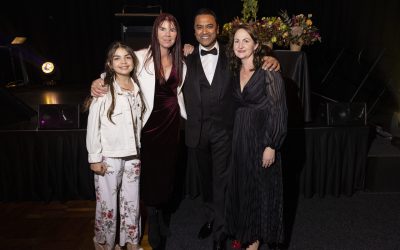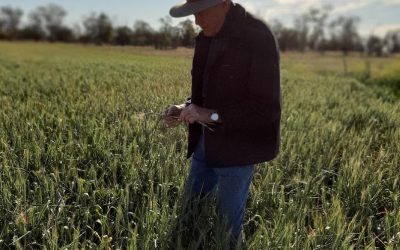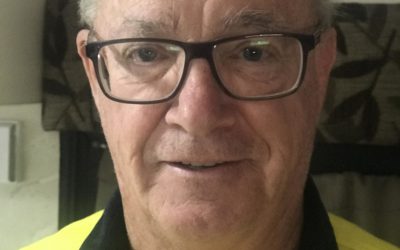There are many different reasons why country people find it difficult or impossible to travel to major cities for health care. For ‘Skip’ (Michael) Field, it’s PTSD.
A fantastic, larger than life character, Skip has lived a life of many turns. He is a proud veteran of the Royal Australian Navy, having been a clearance diver in his youth, involved in underwater warfare and “checking ships bums for ordinance and explosives.”
He has also spent time as a magician, a clinical hypnotherapist, an international motorbike tourist (think Easy Rider) and a successful entrepreneur, having set up motorcycle and scuba diving businesses in Brisbane.
“I’ve had a lot of experiences and gained a lot of things during my life. Unfortunately, one of the things I’ve picked up is PTSD.”
When Skip started experiencing some of the less common symptoms of a heart attack, he assumed it was all in his head.
“Like everyone else, I knew about the classic symptoms, like chest pain, and shooting pain down the arm, but that’s not what I had.”
“It’s a bit of a bizarre story actually. The night before, I’d been talking to a mate of mine about his own recent dance with death. He told me about all the symptoms his heart attack presented with. They were nothing like the ‘Ahhh me heart!’ indications I had previously associated with a heart attack.
“The very next morning, I started to experience those same unusual symptoms, so I assumed it was all in my head because we’d been talking about it. Some kind of hypochondria. I mean, what are the chances?
“But it got worse, and then the severity of my situation became clear pretty quick. I was having a heart attack. And I was 200km away from Brisbane.
“I grabbed my phone and managed to call the ambulance, just in time before I collapsed and was completely incapable of movement. By the time the paramedics arrived, I was utterly powerless. I couldn’t even call out to them; I could only groan – like a bloody dog.
“The paramedics took great care of me, loaded me onto a chopper, and I was flown from my home in Peranga to the hospital in Brisbane. Forty minutes after the chopper took off I was on the operating table getting a stent put in me.”
“I am forever in debt to everyone who got me there. I am unbelievably grateful.”
But as anyone who has ever experienced a heart attack can tell you, surgery is just the start of the heart recovery journey.
“It became clear pretty quickly how big a deal all the recovery care was going to be. If you live in the city, check-ups and recovery protocols are an enormous undertaking. But when you live out where I do, so far from specialist healthcare, it was almost impossible. And that’s before you factor in the PTSD.
“I tried to get follow-up care in my local town, but the specialists just aren’t there. My doctors told me I needed to be seen by a Cardiologist in Brisbane.
“I knew there was no way I was going to be able to do that. It’s hard to explain to someone who’s never had PTSD, but I just can’t do it. It’s not a choice. I just physically and mentally, can’t go.
“If the choice is between going to Brisbane for specialist care or dying, then I’m going to have to die.”
Fortunately, shortly into his recovery period, one of Skip’s doctors heard about the Heart Truck and arranged a referral.
“I got a referral from my doctor, and I rang up and made an appointment for the next week. I spoke to Kat on the Bookings team, and she took great care of me. She’s a gem. She was caring, and not at all patronising or condescending. The Bookings Team are great. Kat should give lessons to every receptionist in Australia on how to be kind and caring over the phone.
“Then, when I went to my appointment, I was blown away by the facilities on the truck. Having specialist medical doctors out in the bush is wonderful. But having a mobile clinic where doctors can function and perform as they would in a big city, that’s revolutionary.
“I had all the tests done right there on the truck, and then I was chatting with the doctor treating me, who was rather upbeat about what I had thought would be my impending doom, and gave me positive and practical directions.
I was telling him how I felt that the guy who started Heart of Australia should be given sainthood or an OBE. He then politely let me know that he was the founder of Heart of Australia. I was astonished because I thought it would have been someone much older. But we both laughed.
“For such a young Cardiologist to start an organisation like this is almost unbelievable. And the genuine caring and concern the whole team shows for people disadvantaged by their location still blows me away.”
“I tell anyone I talk to that Heart of Australia is crucial to rural communities. So many of us can’t be seen by specialist healthcare, for a whole range of reasons. It’s the reality of rural life. Leaving properties, work, and family commitments behind is challenging and for some of us just getting to the city impossible.
“For rural communities, Heart of Australia is life-changing and life-saving. I know first-hand because it was for me.
“Without Heart of Australia, I’d be dead.”



